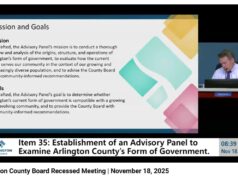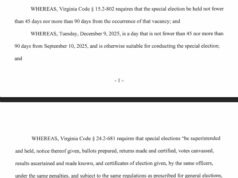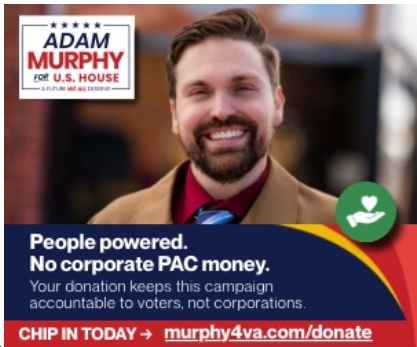On May 19, I sent all four Democratic Arlington County Board candidates Blue Virginia Qs & As and asked for responses by April 5. I told the candidates I’d post responses in the order received, which for the record was: Erik Gutshall‘s at 9:27 pm, Vivek Patil‘s at 10:10 pm and Kim Klingler‘s at 10:14 pm (the other Democratic candidate, Peter Fallon, told me yesterday that he’d have his responses back by today). Voting is on May 9 (7-9 pm at the Key Elementary School), May 11 (7-9 pm at the Drew Model School) and may 13 (11 am-7 pm at Washington-Lee High School). With that, here are Vivek Patil‘s responses.
- Tell us a bit about yourself, and specifically, what in your background and/or temperament makes you the best qualified of the Democratic candidates to serve on the Arlington County Board?
My name is Vivek Shinde Patil. I’m an engineer, entrepreneur, and community builder. Since moving to Arlington, my work with Building Bridges, an outreach group that I co-founded, has taken me to communities across Arlington, listening and building meaningful relationships with Arlingtonians across the county. This has firmed my core belief that a collaborative community and shared empathy for our neighbor has the potential to transform our local discourse.
I’ve spent most of my career in the private sector working at highly innovative life science companies and founding a couple of my own biotech startups. This has prepared me well for the economic challenges we face here in Arlington. We urgently need to diversify our economy by creating a broad mix of innovative companies, small businesses and startups. Diversification will power our commercial tax base, create new economic opportunities for all Arlingtonians and generate the wealth we will need to innovate in our schools, expand housing affordability and modernize our transportation infrastructure. As a member of the Economic Development Commission and experienced entrepreneur, I am uniquely qualified to guide our community through this transformation on the Arlington County Board.
- How would you describe yourself ideologically – “progressive,” “moderate,” “liberal,” or something else? How does your record of votes, endorsements, employment, and other activities reflect your political ideology?
I consider myself a proud Arlingtonian and my voting record and affiliation with the Democratic Party has always been about serving our community, protecting the most vulnerable and creating an environment that allows people to fulfill their ultimate human potential. Progressivism must be proactive and accepting, meeting community members where they work, live and play. I believe that the mission of unifying existing party members and incorporating those on the outside into the fold transcends ideological labels.
- Who is your favorite and who is your least favorite Arlington County politician, present or past, and why?
I admire and respect all of our elected officials that are deeply committed to serving Arlington County.
- As a County Board member, what would your approach be to improving housing affordability in Arlington? Would your emphasis be more on providing subsidies for dedicated “affordable housing” units, more on increasing the supply of housing via zoning and other changes, or some other method(s)?
We have carefully crafted a housing affordability platform that relies on a mix of different approaches like dedicated units, increasing supply and exploring creative new ways to expand housing affordability. Here are our top three priorities and details:
- Expand Housing Affordability Opportunities Across Arlington County
- Work to fulfill the vision of the affordable housing master plan
- Creatively implement planning and zoning ordinances that create a mix of low and middle-income housing clusters across Arlington, not just in specific pockets within the county;
- Support and grow the accessory dwelling ordinance;
- Develop and provide a home-modification credit that allows elderly residents to modify their homes to create mutually beneficial affordable rental units in existing homes.
- Grow the County’s Live Where you Work program
- Creatively re-imagine affordable housing redevelopment
- Redevelop vacant office buildings and older units into affordable residential units through a co-operative investment strategy between residents, property owners and the county;
- Encourage alternative rental models that offer common areas like community kitchens and work spaces, and more affordable living units;
- Explore rent-to-own alternatives that allow renters to create future equity;
- Leverage new technology to make rentals more affordable (e.g. greener buildings that reduce utility costs and ridesharing that lowers car ownership and parking costs)
- Create transition opportunities for current residents in affordable housing units
- Partner with AHC and APAH to offer integrated resident services that creates pathways for low-income residents to transition to middle-income homes and jobs;
- Expand economic opportunities for all Arlingtonians to allow them to live, work and play- right here in Arlington
- Given the potentially draconian cuts we could see in coming months and years from the Trump administration and Republican Congress, what could/would you do to protect Arlington in general, and Arlington’s most vulnerable residents specifically?
We are a deeply progressive and compassionate community and should work pro-actively to protect our most vulnerable Arlingtonians. I believe we should preserve and, if necessary, expand our funding to counter budget cuts to key community organizations that aid the homeless, the hungry, the disabled, the sick, the elderly and the poor. I also believe there are opportunities for greater public-private partnerships to fund these initiatives and will work actively to bring those to fruition.
- As you know, Virginia is a strong “Dillon Rule” state. How best can Arlington operate within these constraints in order to “push the envelope” on progressive and pro-environmental policies while not getting slapped down by a Republican-controlled General Assembly?
The county should work closely with our legal counsel to push the envelope when it comes to exercising strong local self-control. But I also believe that we should work closely with partners across Virginia by reaching out to politicians across the aisle to find common ground on key initiatives. For example, positioning a pro-environment agenda through an economic, high-tech job creation lens could garner support from across the state and help us lead through partnership and collaborative governance. As Hillary Clinton said, we are stronger together.
- What is your position on adequate funding for Metro? Would you support a dedicated revenue source? Increasing Arlington’s contribution to Metro? Other options?
A safe and efficient Metro system is critical to Arlington’s future, both in terms of expanding economic opportunity and enhancing livability. I strongly support adequate funding for Metro. However, given that Arlington is a non-voting member, I support our County board maintaining a close partnership with our VA legislature to ensure Metro is adequately resourced. Additionally, we should continue to advocate for greater transparency and accountability on Metro funding and services.
- Arlington officials like to refer to the county as an “urban village.” Is your long-term vision for Arlington to move in a more “urban” direction, to remain more “village”-like, or what?
A remarkable quality of our community is our mix of different types of neighborhoods. While there will be urban areas in Arlington along the metro corridor for example, there will also be residential village-like areas in our community. I am in favor of maintaining a vibrant mix and feel that communities should be driving their own destiny and their character. Changes should come from inside neighborhoods and not be from the County Board.
- Given development pressures and the lack of strong environmental protection laws in Virginia, how would you protect – and preferably enhance/increase! – Arlington’s tree canopy, streams, natural areas, parks and biodiversity?
I am strongly in favor of Arlington aiming to become a Biophilic City (http://biophiliccities.org/) where nature is integrated in community development and planning activities. Shrinking biodiversity and tree canopy is highly concerning to me. We need to quantify the status of our biodiversity/tree canopy and work to protect, preserve and grow it. Community Greening offers huge economic benefits like increasing tourism and energy efficiency, but also leads to better health outcomes, aesthetics and stronger communities.
- How would you define the concept of an “Arlington Way?” Does this actually exist or is it mostly just rhetoric? How well (or poorly) do you think it’s been working in recent years, and what changes would you propose moving forward to strengthen it?
The Arlington Way is an exciting and inclusive community concept that encourages and invites active community feedback and participation. However, in my conversations with the community, I’ve heard that it has become more contrived in recent years. County staff often has made its decision before soliciting community feedback. It appears the community discussions have become more contentious with issues and interests siloed and pit against each other. I’d like to see a more collaborative community, where all stakeholders are brought to the table, communities are proactively provided with adequate data before the start of a project, feedback is solicited and the county works in partnership with stakeholders to advance the project through efficient and facilitated decision making. There is a need for greater transparency, efficiency and responsiveness in our decision making.
- What do you think the current Board is doing well? What do you think it needs to improve on? Are there any areas where the Board is doing poorly? How would you propose fixing what’s not working well?
I believe the county board is more collaborative, responsive and actively solicits feedback from the community. That said, I’d like to see greater collaboration between the county and school boards. The JFAC is a great first step. Similarly, the county board’s vision to recruit more industry to Arlington (e.g. Nestle) is a great step forward, but more can be done to help small businesses and drive a sustainable, diversified economic vision.
- What ever happened to the proposed Long Bridge Park aquatics and fitness facility, and do you support moving ahead with it?
In my conversations with our community, the aquatic center is seen as a welcome addition and I am supportive of it. However, I am also keen to explore alternate ideas and venues for locating not just this aquatic center but our future community facilities. After all, an open, efficient and transparent planning process around community facilities is going to be key to our community’s future recreational offerings.
- What would you propose to jumpstart Arlington’s Initiative to Rethink Energy (AIRE)? More broadly, how can we move Arlington to a clean energy-powered county as rapidly as possible?
- Leverage the Community Energy Plan as a Framework for Big Thinking on Clean Energy Initiatives
- Expand Arlington’s energy efficient ‘green’ building development programs;
- Support and grow voluntary incentive programs like “Green Home Choice” that facilitate weatherization and energy efficient home improvements for Arlington residents;
- Explore creation of ‘Municipal Green Bonds’ to fund some of these county initiatives;
- Emphasize energy efficiency programs for the disabled and elderly that help them reduce utility costs and age in place.
- Strive to Make Arlington More ‘Biophilic’
- Explore urban greening initiatives like green roofing and the integration of nature in our urban landscape;
- Explore offering multi-tier recycling and composting opportunities for Arlingtonians;
- Advance green planning concepts that add more plants and trees to home and building designs. These serve as nature’s temperature barriers to keep structures from getting too hot in the summer, lowering our energy consumption and electricity costs.
- Stimulate a Clean and Green-Tech Startup Infrastructure in Arlington
- Partner with Arlington Economic Development’s Startup Arlington program to attract and incentivize new clean and green-tech companies and startups in Arlington;
- Explore creating a public-private partnered ‘innovation prize’ to spur creative thinking and entrepreneurship on energy storage technology.
- Anything else we haven’t covered and that you think should be?
As a community that aims to be inclusive and welcoming, we have an obligation to ensure that Arlingtonians receive equal pay for equal work. Arlington has been leading the charge towards pay parity in Virginia, but there is more that can and should be done to make our economy work for all Arlingtonians. To achieve this, I’d work tirelessly to:
- Commission an immediate study to explore where pay gaps exist in our county government;
- Learn from (and partner with) neighboring Alexandria which reportedly has one of lowest pay gaps among local governments;
- Ensure equal starting pay across county job classifications and establish a clear, transparent merit pay system for both women and men.
- Encourage private enterprise in Arlington to address pay gap issues to align with community values.












